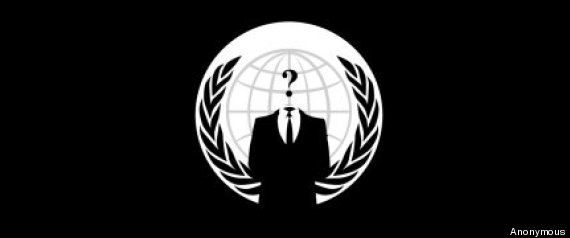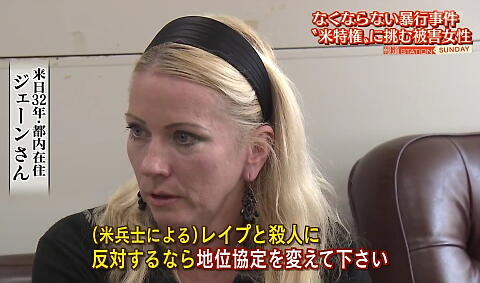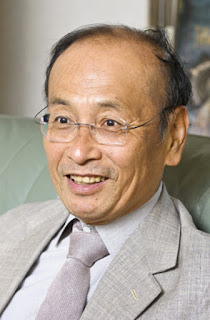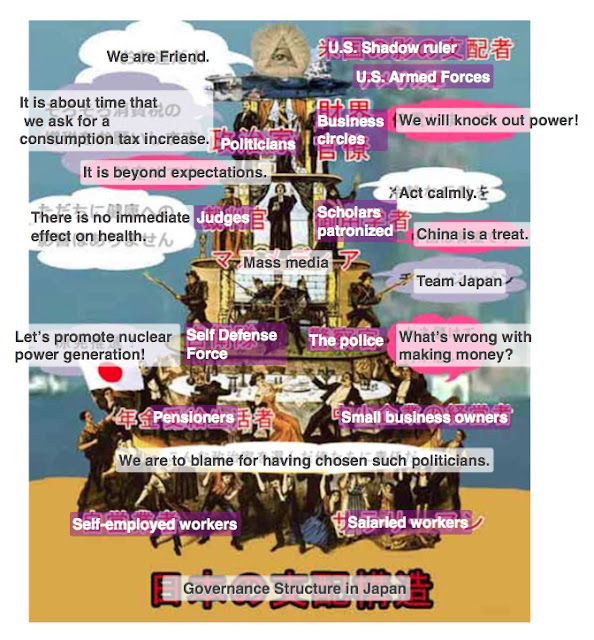Old Iiyama is not old for nothing. Indeed, a person like Old Iiyma who has a deep insight into true nature of everything knows well about “the real villain” behind “CSIS or Heritage Foundation.” If this part is focused on, many people make a fool of it as conspiracy theory. However, if you read books by Dr. John Coleman and Fritz Springmeier, you must understand that conspiracy is not delusion, but it does exist as a fact. Guaranteed conspiracy is about UFO information. If this is disclosed, everything of conspiracy will fall apart to pieces.
Masatoshi Takeshita
November 26, 2012
English translation of an excerpt from a Japanese article: Ichiro Iiyama’s LittleHP – Nov. 26, 2012 –
“Devil” with Absolute Intention to Collapse Japan Exists!
When I’ve got to a website of Nikkei Shimbun and searched for articles written about the subject “SHARP,” I’ve found many articles obviously with bad intentions to drive the share price of SHARP lower one after another. “Nikkei Shimbun is a public relations magazine for U.S. hyena corps!” I wrote it in “Ron yori Shouko (The proof is in the eating).” The hyena corps aims:
l to collapse SHARP, liquidate it, and run off with profitable technology alone,
l to drive SHARP’s share price way down to around JPY50 and make a profit by short selling, and
l to buy collecting stocks in the midst of a sharp fall of the SHARP share and take it over.
Reading Nikkei articles which give SHARP a bad name, it is easily understood.
The other day I wrote the text entitled “Does ‘Devil’ with Absolute Intention to Collapse Japan exist?”
In the text there is a sentence – ‘Bad intentions’ to purposely collapse Japanese corporations – (Link). The Nikkei Shimbun has a lot of articles with intentions to drive SHARP’s share price way down.
We see obvious “bad intentions” to purposely collapse Japanese corporations.
Well, does the “devil” with intention to collapse Japan exist?
To speak plainly, it does exist!
CSIS (the Center for Strategic and International Studies) is it!
I’d like to write the name of another “devil” that has an evil mind to collapse Japan,
It is the “Heritage Foundation,” notorious as “Missile Foundation” among U.S. warmongers. The Foundation may be considered as a genuine devil.
Shintaro Ishihara is a servant and cheap hoodlum of the Heritage Foundation.
The CSIS has served as a playmaker that advocates TPP, nuclear power generation and consumption tax hike. There are innumerable slave politicians. Junichiro Koizumi heads the top of the list. I don’t mention others as it is a rather long story.
Oh, I’ like to note Kouzo Watanabe, Akihisa Nagashima, Kiyomi Tsujii and the Japan Communist Party.
Undoubtedly, devils are going to collapse Japan as I mentioned in “Does ‘Devil’ with Absolute Intention to Collapse Japan exist?”.
They are going to collapse SHARP Japan is proud of, a corporation which has addressed technological development of ultrahigh-performance electronics and to prey Panasonics and Sonny, or rather they are going to make the whole Japan contaminated with radiation and collapse it.
Additionally, U.S. devils have fomented Japanese hatred of China and Korea with the use of all mass media to have Japan and China at war with each other.
I have also such misperception that residents of Korean decent and North Koreans have done harm to Japan. Real evil or the nerve center of evil is CSIS and the Heritage Foundation that have made residents of Korean decent and politicians of North Korean decent, and Nikkei Shimbun Yomiuri Shimbun and Asahi Shimbun all their slaves.
(However, there are inhuman villains behind the CSIS and Heritage Foundation.)
Therefore, if we hate Chinese and Koreans or neighboring countries such as China and Korea, it means that we will have been caught in a Japan-China divide and rule strategy mapped out by a group of U.S. warmongers.
Actually, Japan has been trapped by the plot of the Heritage Foundation and Shintaro Ishihara. As a result Japan-China relations have been shattered, Japan’s economy has been terribly undermined, and all Japanese can do is to hate neighboring countries.
If this goes on, Japan will be helpless. If this goes on! If this goes on!




